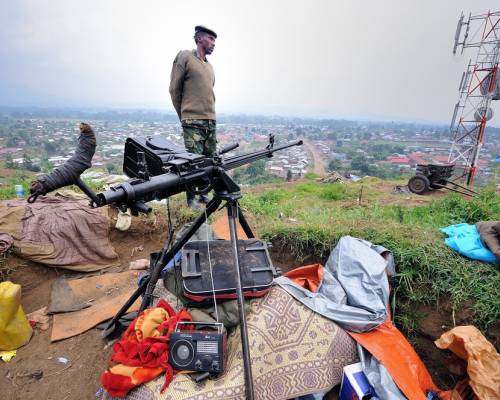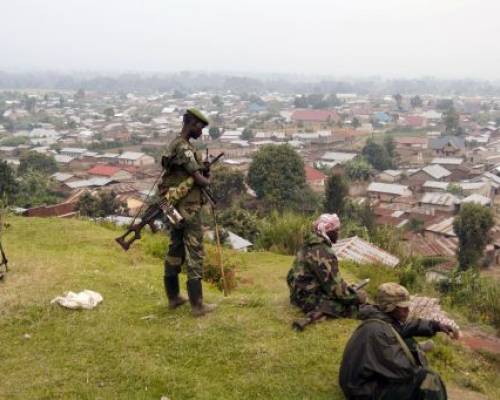What is going on in Eastern DRC ? An in depth look
The British daily newspaper, the Telegrapagh, looks at what is happening in the DRC; Eastern Democratic Republic of Congo.
Costing $.15bn per year, the UN force in the Democratic Republic of the Congo is the largest mission in the organisation's history. Yet the 20,000 strong force, known as Monusco, is struggling for credibility. On Twitter, it is known by the hashtag #MONUSELESS.
Peacekeepers are accused of standing by when the allegedly Rwanda-backed March 23 movement (M23) conquered the city of Goma for 10 days last November. It is also accused of blurring the lines between military and humanitarian activity, and for its appalling record in protecting the civilian population and restoring state authority, which requires engaging with the ulterior motives of politicians and propping up an army notorious for human rights abuses.
Monusco and its predecessor, Monuc, never had an easy task. Started in 1999 as an observer mission, a relatively small team found itself watching the gloomy reality of a conflict known as Africa's "world war", pitting nine states and rebel groups against each other. The Security Council enlarged, expanded and tasked it with ensuring the success of Congo's first democratic elections in 2006. But Monuc remained toothless, dependant on backup: during elections an EU force was required to secure Kinshasa. Monuc was not able to prevent the siege of Bukavu by rebel commanders in 2004, nor counter threats posed by the Rwandan FDLR militia or the National Congress for the Defence of the Congolese People (CNDP) rebellion.
The DRC continued to suffer from ill-conceived international intervention, insecurity, and ongoing rebel attacks in the east, culminating in Monuc's 2010 transition to Monusco, following growing international criticism and threats of expulsion by the government. During the country's second elections in 2011, Monusco witnessed the creation of M23.
After the fall of Goma, success occasionally came. The UN established a Force Intervention Brigade (FIB) which was given a mandate to "neutralise" armed groups, and the Peace, Security, and Cooperation Framework (PSCF), the first promising international agreement in years, was signed. While failures regularly made the news, without the UN mission, insecurity would be worse.
Although it has only recently become fully operational, the Force Intervention Brigade already faces mockery. Delayed deployment, confusion over a Goma ‘security zone’ – the blunders multiplied, exposing a serious leadership issue - diplomat Martin Kobler replaced Roger Meece as head of mission after only one month. And it was the mission’s humanitarian coordinator who announced the military ultimatum – a curious meshing of duties.
To make matters worse, Monusco has a hard time dealing with the state, which is reluctant to reform the security sector. Talks must remain credible and Kobler must push for disarmament, demobilisation, and reintegration. Such efforts only work if accompanied by strong political commitment. Once soldiers are paid and demobilised combatants are genuinely reintegrated, Congo's cycle of militarisation may be easier to tackle.
Besides M23, more than 40 rebel groups operate in the eastern Congo. Alas, the UN's present carrots-and-sticks approach is defunct as there are neither carrots nor sticks: the former are either unethical (eg amnesty for war criminals) or unrealistic (eg successful peace talks in the near future). On the side of sticks, the intervention brigade is yet to deliver proof that it can live up to expectations without acting too partially in its support to the government army.
In late August, M23 and the military recommended hostilities. As bombs fell both in Congo and Rwanda, the two countries blamed each other for violating territorial sovereignty. The UN attributes the shelling to M23 and ordered the intervention brigade's first participation in the hostilities on 23 August as anti-Monusco demonstrations multiplied - civilians blame Monusco for not protecting Goma. FARDC and M23 clashes continue, with the possibility that the Rwandan military will be forced to intervene should shelling continue.
With M23 declaring a unilateral ceasefire on Friday, there are indications - however fragile - that the joint UN and DRC mission might be gaining the upper hand. Only by using its political clout from above, while joining forces with Congolese civil society below, can Monusco’s mission succeed.
RPS Partnership has reliable and factual information from within North Kivu. Anyone wishing to travel there and needing travel advice, please contact us at [email protected]
Adapted by from an article orginally written in the Telegrpah, by James Bailey, an RPS consultant.
Photos: Al Jazeerah



